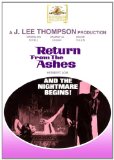| Reviews & Columns |
|
Reviews DVD TV on DVD Blu-ray 4K UHD International DVDs In Theaters Reviews by Studio Video Games Features Collector Series DVDs Easter Egg Database Interviews DVD Talk Radio Feature Articles Columns Anime Talk DVD Savant Horror DVDs The M.O.D. Squad Art House HD Talk Silent DVD
|
DVD Talk Forum |
|
|
| Resources |
|
DVD Price Search Customer Service #'s RCE Info Links |
|
Columns
|
|
|
Return From The Ashes
"What I'm about to propose to you is bizarre, grotesque...but I'm sure you'll understand it."
A beguiling, thoroughly strange 60s murder mystery that's most welcome. M-G-M, through their M.O.D. ("manufacture on demand") Limited Edition Collection (now distributed through Warners' own M.O.D., the Archive Collection), has released Return From the Ashes, the 1965 J. Lee Thompson-directed drama/thriller starring the powerhouse trio of Maximilian Schell, Samantha Eggar, and Ingrid Thulin. Slinky and darkly funny, Return From the Ashes enjoys being odd and off-center as it ping-pongs back and forth from its seemingly incompatible sub-genres (romantic comedy, murder mystery, adulterous sex drama...and Holocaust survivor film). One of talented, entertaining director Thompson's best films.
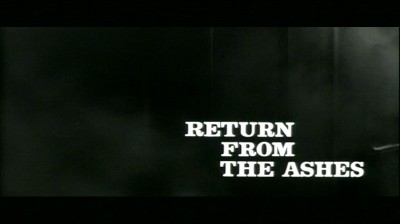
The winter of Liberation, France, 1945. Holocaust survivor Dr. Michele Wolf (Ingrid Thulin) comes back to Paris hoping to find her second husband, indolent charmer and chess player-for-money, Stanislaus Pilgrin (Maximilian Schell). Calling on the telephone to her home, but refusing to speak, the shocked Michele discovers that Stan is now with her estranged step-daughter, Fabienne (Samantha Eggar), whom Michele hasn't seen since "Fabi" was a little girl. Tracking down loyal friend Dr. Charles Bovard (Herbert Lom), who at first doesn't recognize the horribly-scarred "Mischa," Michele undergoes plastic surgery to restore her looks...before she plots her revenge against Stan and Fabi. However, Fabi and Stan have plans of their own for Michele's newly-inherited fortune.
PLOT SPOILERS WARNING!
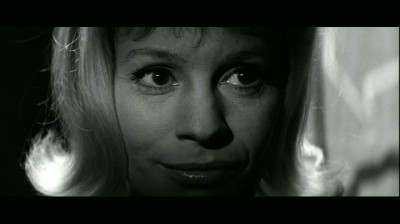
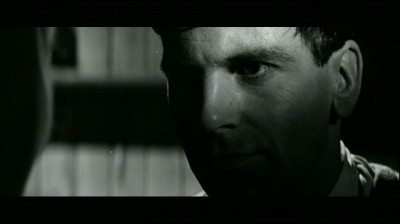
Just a small note: it's impossible to discuss Return From the Ashes without revealing its weird twists and turns...as well as, perhaps, its surprise ending. So be forewarned: if you've never seen the film, and you've liked what you've read so far, I recommend not reading any further. Just order the film from Warners' Archive Collection on-line. If not...I did warn you.
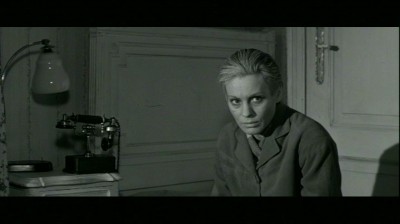
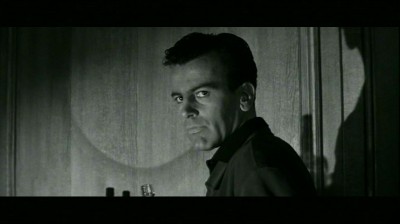
A weird, almost perverse conglomeration of diverse story elements, Return From the Ashes seems immediately...odd right from the opening scene, and enjoyably stays that way throughout its longish running time. In a scene I'm still trying to figure out, the movie begins with Mischa on the train returning to Paris. A small boy named Robert is kicking the window wall of the compartment, annoying the hell out of everyone seated there...except Mischa, who stares blankly out into space. Suddenly, the little boy, a brat who won't stop his noise when his mother asks him to, opens the outside compartment door and falls, presumably, to his death. Everyone is horrified, of course...except Mischa, who again doesn't react. The passengers are angry with her, until they notice her camp numbers tattooed on her arm, and that's when composer John Dankworth's beautifully slinky little organ theme pops up, promising, incongruously, fun and intrigue. Who was the boy? What does his fall have to do with the rest of the movie? Is his death merely there to show how far Mischa has been damaged by the war? But then why does she call herself "Madame Robert" when she checks into her hotel? And if she was so unmoved by his death, why does she later tell Stan that Dachau made her realize she was a Jew and a mother? Would a mother react that way to a little boy falling off a speeding train? I'm still not sure what that opening scene means...but I love its mysteriousness, its weird humor (after all...that's just what that little brat deserved, most of the compartment's occupants may have thought), and its dark obscurity (the movie is heavy with dark, shadowy lighting and framing, just like Thompson's earlier masterpiece, Cape Fear). And that peculiar, eerie mood runs through the whole film.
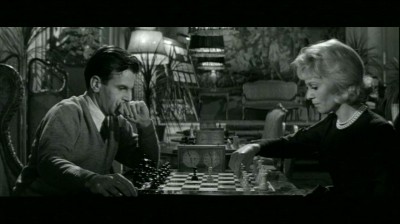
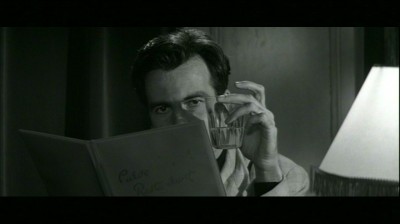
Based on a novel by French author Hubert Monteilhet, Julius J. Epstein's screenplay (no less than Casablanca, Tall Story, Send Me No Flowers, and Cross of Iron just to name a few of his diverse scripts) moves from this wowzer opening to a sick, funny flashback sequence set in 1938 which grotesquely apes a traditional romantic comedy "meet cute" sequence. Michele aggressively picks up Stan after losing three games of chess-for-money to him, before she returns to his horrible, empty flat, where he's been keeping a stray alley cat in a cage...to eat (it's the fattest one he had caught so far, suggesting he had been living on them). There in his flat, they discuss Dostoevsky's The Brothers Karamazov as Stan enthusiastically reads a section that confirms his belief in no morality, no sin (Schell's oily, slick charm and clipped, blank reactions are used to great effect by Thompson). Epstein doesn't spare Michele, either, having her actively enjoy her sick, opportunistic relationship with the unloving Stan, where she openly tells him she enjoys dribbling out money to him for sex. There's no redemption for Stan (he can't even commit totally to his fraud; he physically recoils from her occasional need to have him love her), while her suffering at the hands of the Nazis (which isn't shown) is the only event that brings her back to audience sympathy. Importantly here, she shows Stan how she, too, could be the kind of survivor who lives on alley cat meat: at Dachau, she prostituted herself in the infamous "House of Pleasure" so she wouldn't starve. Thulin, in another failed bid for international movie stardom after the disastrous 1962 remake of The Four Horsemen of the Apocalypse, is remarkably good in this scene and throughout the film, giving a sensitive, evocative portrayal that's way outside the script.
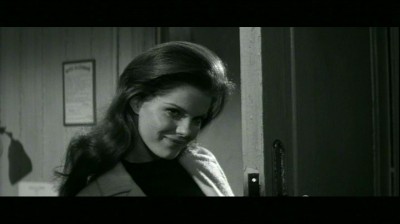
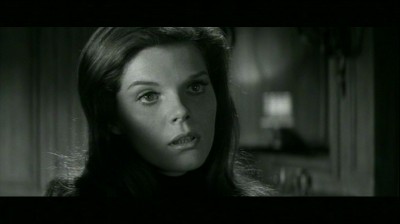
Epstein delves deeper into perversity when he sketches Fabi (perfectly captured by the stunning, cold Eggar). As with Stan, completely amoral, she turns out to be the brains of the cunning pair, devising not one but two ingenious plans to score all the money that Mischa inherited when her relatives perished in the war. Epstein and Thompson have quite a bit of fun in this middle section of the film, taking the sick relationship Fabi has with her step-mother's husband, and twisting into an adulterous threesome framework with overtones of flat-out bedroom farce (there's a marvelous scene where Thompson cross-cuts between Stan reunited with Mischa in bed, while his lover Fabi slowly goes mad with jealousy in the next room). Giving Eggar the best lines in this already witty, clever script (Fabi states at one point she's going to the movies, where her favorite kind of Western is playing: the ones where "barely anyone is alive at the end."), Fabi comes over as a completely mad little sexpot with clear homicidal tendencies, and she compliments Schell's weak, craven would-be murdered perfectly ("It must be wonderful to be so young, and so evil," he purrs to Fabi, to which she replies, with level gaze and sexy smile, "You have no idea...how evil.").
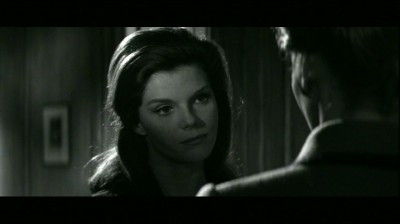
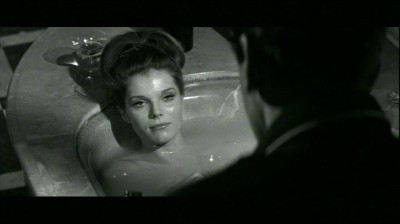
The final section of the film slips into a more traditional Agatha Christie-type murder mystery mode (with some Dial M for Murder thrown in for good measure), and I would guess that most of the viewers and critics who didn't enjoy Return From the Ashes probably latched onto the denoument here which some have labeled implausible (don't worry...you didn't really think I was going to spoil the ending....did you?). There's an old saying in producers' circles that goes "the last ten minutes of a film makes or breaks you." If that's the case, it all depends on how far you're willing to go with Return From the Ashes as to whether or not you're going to enjoy this about-face in terms of focus. It worked for me, just as much for its incongruity with the rest of the film as for any innate cleverness of the murder plot. I like that this final section is just as out-of-place as the previous two or three mini-little movies created inside the movie as a whole. It's part of the weird, almost sick charm of Return From the Ashes, one that makes you stop and say to yourself, "Now why the hell are they going in that direction?" And that's not something you can say too often about many star-studded, big-budget studio films from the 1960s.
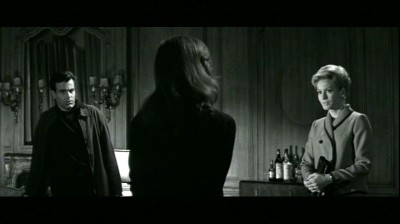
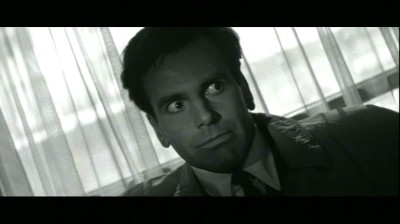
The DVD:
The Video:
Certainly there are some rough patches here and there in the anamorphically enhanced, 2.35:1 widescreen black and white transfer of Return From the Ashes, including some scratches and blemishes from the print used here, as well as some contrast fluctuation from time to time. Still, this looks quite good overall, with a sharpish image and deep blacks.
The Audio:
The English mono audio track is serviceable, with a decent re-recording level and minimal, but noticeable, hiss. No close-captions or subtitles.
The Extras:
Sweet―an original trailer is included here, with a marketing angle that misses the more subtle pleasures of the film.
Final Thoughts:
Strange, perverse melding of several different genre conventions to make a thoroughly odd, eerie drama/mystery. All three leads are excellent here, and Julius Epstein's clever, witty script is tops, as is director J. Lee Thompson's deadpan black humor. A forgotten little gem that wasn't appreciated when it first came out, and one that needs re-discovering. I highly, highly recommend Return From the Ashes.
Paul Mavis is an internationally published film and television historian, a member of the Online Film Critics Society, and the author of The Espionage Filmography.


|
| Popular Reviews |
| Sponsored Links |
|
|
| Sponsored Links |
|
|
| Release List | Reviews | Shop | Newsletter | Forum | DVD Giveaways | Blu-Ray | Advertise |
|
Copyright 2024 DVDTalk.com All Rights Reserved. Legal Info, Privacy Policy, Terms of Use,
Manage Preferences,
Your Privacy Choices | |||||||









